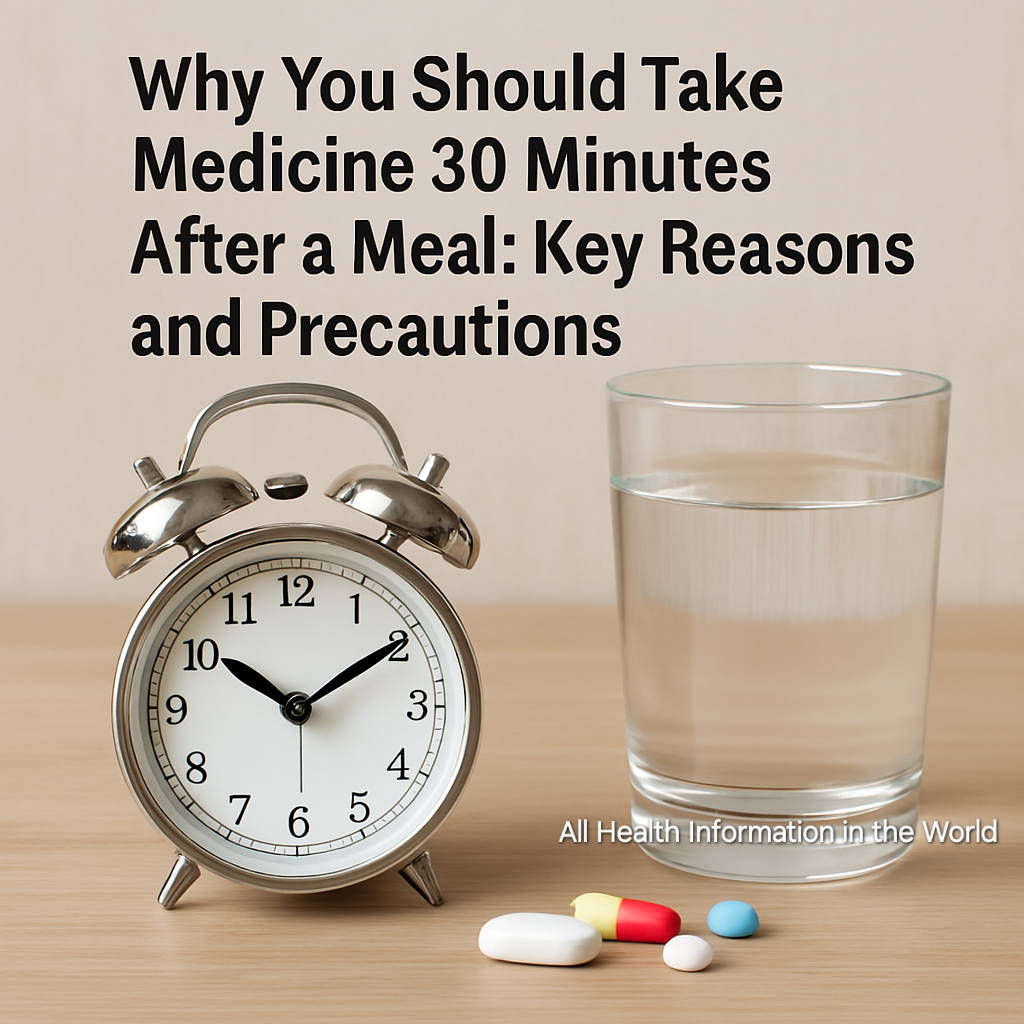🔰 Table of Contents 🔰
1. Why Take Medicine After a Meal?
2. Main Benefits of Post-Meal Medication
3. Important Precautions When Taking Medicine
4. Does Every Medicine Require Food?
5. Final Thoughts

1. Why Take Medicine After a Meal?
Many medications are recommended to be taken 30 minutes after eating. This guideline isn’t just a random rule—it’s based on how the human body digests food, absorbs substances, and reacts to medicine.
Taking medication at the right time can enhance its effectiveness, reduce side effects, and protect your digestive system.
2. Main Benefits of Post-Meal Medication
1) Protects the Stomach Lining
Some medications, such as NSAIDs or iron supplements, can irritate your stomach lining. After eating, food acts as a protective barrier, helping reduce symptoms like heartburn or gastric discomfort.
2) Supports Digestive Enzymes
Your body releases digestive enzymes during meals. Waiting 30 minutes allows digestion to begin, which can help your body absorb the medicine more efficiently and consistently.
3) Improves Absorption
Certain medications break down too quickly on an empty stomach due to stomach acid. When you wait 30 minutes after eating, your stomach’s pH levels are more balanced, allowing for better absorption into the bloodstream.
4) Enhances Medication Effectiveness
When medicine is taken after food has entered your digestive tract, it moves more slowly and steadily through your system. This can lead to a more stable release of the active ingredients and better therapeutic effects.
5) Works Better With Certain Drugs
Some medications, such as orlistat (a weight-loss drug), work specifically with the food you’ve eaten. In orlistat’s case, it blocks fat absorption, so it must be taken with or shortly after a meal that contains fat.
6) Helps Maintain Steady Drug Levels
Consistency is key in medicine. Taking your medication 30 minutes after meals helps establish a regular routine and keeps drug levels steady in your bloodstream—especially important for chronic conditions.
7) Minimizes Side Effects
Many common side effects, like nausea or upset stomach, are reduced when medications are taken after food. This is particularly true for antibiotics, painkillers, and other strong drugs.
8) Depends on the Type of Medicine
Not every drug should be taken after eating.
For example, diabetes medications like glipizide are usually taken 30 minutes before a meal to help control blood sugar spikes. Osteoporosis treatments like alendronate are often taken on an empty stomach for better absorption.

3. Important Precautions When Taking Medicine
Use Lukewarm Water: Swallow pills with water that’s close to body temperature. Cold or hot drinks can interfere with absorption.
Avoid Certain Drinks: Don’t take medications with soda, coffee, milk, or juice—these can block or alter the effects of many drugs.
Always Follow Your Doctor’s Instructions: Medication guidelines vary. Some pills are sensitive to food, others aren’t. Always follow the specific advice from your physician or pharmacist.
Watch Out for Food Interactions: Certain foods, like grapefruit juice, can interact dangerously with some medications. Check with your healthcare provider if you’re unsure.
Be Aware of What You Eat: Fatty or high-protein meals can affect how certain drugs work. Keep your diet consistent when taking long-term medication.
Stick to a Schedule: Even if you’re told to take medicine “after a meal,” don’t delay too long. Set a reminder for 30 minutes after eating and try to take your medication at the same times each day.
Monitor for Side Effects: If you feel dizzy, nauseated, or experience other symptoms after taking medication—even if it's post-meal—consult your doctor right away.

4. Does Every Medicine Require Food?
Not at all. Some medications are best taken on an empty stomach, while others are taken with food or immediately after.
The timing depends on how the drug is absorbed and how it interacts with your body. That’s why personalized advice from your healthcare provider is essential.
5. Final Thoughts
Taking medicine 30 minutes after a meal can improve absorption, reduce side effects, and enhance therapeutic benefits. But remember—not all medications follow this rule.
Always read the label and follow professional guidance. A little attention to timing can go a long way in making your treatment safer and more effective.
©️ All Health Information in the World
'All Health Information' 카테고리의 다른 글
| What Is Forgetfulness? Cause, Prevention, and Treatment Explained (0) | 2025.04.13 |
|---|---|
| Peaches on an Empty Stomach, When Sweetness Turns Against You (0) | 2025.04.12 |

